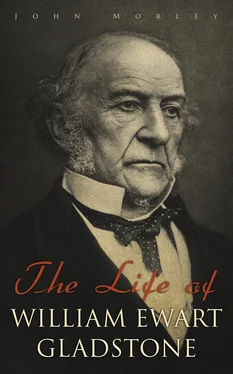I went with Denison and another man named Jeffreys between eleven and twelve. We began to talk to some men among Weyland's friends; they crowded round, and began to holloa at us, and were making a sort of ring round us preparatory to a desperate hustle, when lo! up rushed a body of Norreys' men from St. Thomas's, broke their ranks, raised a shout, and rescued us in great style. I shall ever be grateful to the men of St. Thomas's. When we were talking, Jeffreys said something which made one man holloa, 'Oh, his father's a parson.' This happened to be true, and flabbergasted me, but he happily turned it by reminding them, that they were going to vote for Mr. Harcourt, son of the greatest parson in England but one (Archbishop of York). Afterwards they left me, and I pursued my work alone, conversed with a great number, shook hands with a fair proportion, made some laugh, and once very nearly got hustled when alone, but happily escaped. You would be beyond measure astonished how unanimous and how strong is the feeling among the freeholders (who may be taken as a fair specimen of the generality of all counties) against the catholic question. Reformers and anti-reformers were alike sensitive on that point and perfectly agreed. One man said to me, 'What, vote for Lord Norreys? Why, he voted against the country both times, for the Catholic bill and then against the Reform.' What would this atrocious ministry have said had the appeal to the voice of the people, which they now quote as their authority, been made in 1829? I held forth to a working man, possibly a forty-shilling freeholder, [he adds in a fragment of later years,] on the established text, reform was revolution. To corroborate my doctrine I said, 'Why, look at the revolutions in foreign countries,' meaning of course France and Belgium. The man looked hard at me and said these very words, 'Damn all foreign countries, what has old England to do with foreign countries?' This is not the only time that I have received an important lesson from a humble source.
SPEECH AT THE UNION
A more important scene which his own future eminence made in a sense historic, was a debate at the Union upon Reform in the same month, where his contribution (May 17th) struck all his hearers with amazement, so brilliant, so powerful, so incomparably splendid did it seem to their young eyes. His description of it to his brother (May 20th, 1831) is modest enough:—
I should really have been glad if your health had been such as to have permitted your visiting Oxford last week, so that you might have heard our debate, for certainly there had never been anything like it known here before and will scarcely be again. The discussion on the question that the ministers were incompetent to carry on the government of the country was of a miscellaneous character, and I moved what they called a 'rider' to the effect that the Reform bill threatened to change the form of the British government, and ultimately to break up the whole frame of society. The debate altogether lasted three nights, and it closed then, partly because the votes had got tired of dancing attendance, partly because the speakers of the revolutionary side were exhausted. There were eight or nine more on ours ready, and indeed anxious. As it was, there were I think fifteen speeches on our side and thirteen on theirs, or something of that kind. Every man spoke above his average, and many very far beyond it. They were generally short enough. Moncreiff, a long-winded Scotsman, spouted nearly an hour, and I was guilty of three-quarters. I remember at Eton (where we used, when I first went into the society, to speak from three to ten minutes) I thought it must be one of the finest things in the world to speak for three-quarters of an hour, and there was a legend circulated about an old member of the society's having done so, which used to make us all gape and stare. However, I fear it does not necessarily imply much more than length. Doyle spoke remarkably well, and made a violent attack on Mr. Canning's friends, which Gaskell did his best to answer, but very ineffectually from the nature of the case. We got a conversion speech from a Christ Church gentleman-commoner, named Alston, which produced an excellent effect, and the division was favourable beyond anything we had hoped—ninety-four to thirty-eight. We should have had larger numbers still had we divided on the first night. Great diligence was used by both parties in bringing men down, but the tactics on the whole were better on our side, and we had fewer truants in proportion to our numbers. England expects every man to do his duty; and ours, humble as it is, has been done in reference to this question. On Friday I wrote a letter to the Standard giving an account of the division, which you will see in Saturday's paper, if you think it worth while to refer to it. The way in which the present generation of undergraduates is divided on the question is quite remarkable.
The occasion was to prove a memorable one in his career, and a few more lines about it from his diary will not be considered superfluous:—
May 16th .—Sleepy. Mathematics, few and shuffling, and lecture. Read Canning's reform speeches at Liverpool and made extracts. Rode out. Debate, which was adjourned. I am to try my hand to-morrow. My thoughts were but ill-arranged, but I fear they will be no better then. Wine with Anstice. Singing. Tea with Lincoln.
May 17th .—Ethics. Little mathematics. A good deal exhausted in forenoon from heat last night. Dined with White and had wine with him, also with young Acland. Cogitations on reform, etc. Difficult to select matter for a speech, not to gather it. Spoke at the adjourned debate for three-quarters of an hour ; immediately after Gaskell, who was preceded by Lincoln. Row afterwards and adjournment. Tea with Wordsworth.
When Gladstone sat down, one of his contemporaries has written, 'we all of us felt that an epoch in our lives had occurred. His father was so well pleased with the glories of the speech and with its effect, that he wished to have it published. Besides his speech, besides the composition of sturdy placards against the monstrous bill, and besides the preparation of an elaborate petition 51and the gathering of 770 signatures to it, the ardent anti-reformer, though the distance from the days of doom in the examination schools was rapidly shrinking, actually sat down to write a long pamphlet (July 1831) and sent it to Hatchard, the publisher. Hatchard doubted the success of an anonymous pamphlet, and replied in the too familiar formula that has frozen so many thousand glowing hearts, that he would publish it if the author would take the money risk. The most interesting thing about it is the criticism of the writer's shrewd and wise father upon his son's performance (too long for reproduction here). He went with his son in the main, he says, 'but I cannot go all your lengths,' and the language of his judgment sheds a curious light upon the vehement temperament of Mr. Gladstone at this time as it struck an affectionate yet firm and sober monitor.
HEARS HIS FIRST DEBATE
In the autumn of 1831 Mr. Gladstone took some trouble to be present on one of the cardinal occasions in this fluctuating history:—
October 3rd to 8th .—Journey to London. From Henley in Blackstone's chaise. Present at five nights' debate of infinite interest in the House of Lords. The first, I went forwards and underwent a somewhat high pressure. At the four others sat on a round transverse rail, very fortunate in being so well placed. Had a full view of the peeresses. There nine or ten hours every evening. Read Peel's speech and sundry papers relating to King's College, which I went to see; also London Bridge. Read introduction to Butler. Wrote to Saunders. Much occupied in order-hunting during the morning. Lord Brougham's as a speech most wonderful, delivered with a power and effect which cannot be appreciated by any hearsay mode of information, and with fertile exuberance in sarcasm. In point of argument it had, I think, little that was new. Lord Grey's most beautiful, Lord Goderich's and Lord Lansdowne's extremely good, and in these was comprehended nearly all the oratorical merit of the debate. The reasoning or the attempt to reason, independently of the success in such attempt, certainly seemed to me to be with the opposition. Their best speeches, I thought, were those of Lords Harrowby, Carnarvon, Mansfield, Wynford; next Lords Lyndhurst, Wharncliffe, and the Duke of Wellington. Lord Grey's reply I did not hear, having been compelled by exhaustion to leave the House. Remained with Ryder and Pickering in the coffee-room or walking about until the division, and joined Wellesley and [illegible] as we walked home. Went to bed for an hour, breakfasted, and came off by the Alert. Arrived safely, thank God, in Oxford. Wrote to my brother and to Gaskell. Tea with Phillimore and spent the remainder of the evening with Canning. The consequences of the vote may be awful. God avert this. But it was an honourable and manly decision, and so may God avert them. This was the memorable occasion when the Lords threw out the Reform bill by 199 to 158, the division not taking place until six o'clock in the morning. The consequences, as the country instantly made manifest, were 'awful' enough to secure the reversal of the decision. It seems, so far as I can make out, to have been the first debate that one of the most consummate debaters that ever lived had the fortune of listening to.
Читать дальше









![William Frith - John Leech, His Life and Work. Vol. 1 [of 2]](/books/747171/william-frith-john-leech-his-life-and-work-vol-thumb.webp)


![William Frith - John Leech, His Life and Work, Vol. 2 [of 2]](/books/748201/william-frith-john-leech-his-life-and-work-vol-thumb.webp)